2025 Conference Speakers
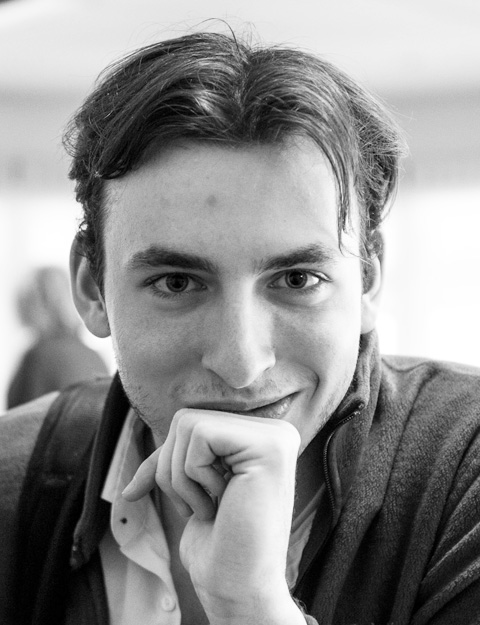
John Arlievsky
Russian-American baritone John Arlievsky “not only has a pleasing and expressive voice, but also excels as a storyteller” (David Rice, Classical Source). As a second year Vocal Fellow at the prestigious Tanglewood Music Festival for Summer 2025, his chamber, recital, and orchestral appearances as a soloist feature repertoire spanning from J.S. Bach to George Crumb and all in-between. John is in the midst of the MM degree program at Yale Opera, where the ’24-25 season saw him as Tobias in Rossini’s La Cambiale di matrimonio, Bustamente in Masanet’s La Navarraise, Bertran in Tchaikovsky’s Iolanta, Fitzroy in the premier of Darwin en Patagonia, in recital (including premiering a piece setting journal entries and stories written by his older brother when he was in the first grade), and in excerpted acts from Le Nozze di Figaro, Florencia en el Amazonas, and La Bohème. Recent highlights also include concerts with the Washington Chamber Orchestra, productions with Peabody Opera Theatre as Pa Zegner in Proving Up and in the title role of Don Giovanni, and artist residencies with Denyce Graves Foundation and The Castleton Festival. John began voice study with Sharon Sweet at Westminster Choir College while pursuing majors in piano and composition before honing a focus on singing. He finished undergraduate study in the voice studio of Randall Scarlata at Peabody Conservatory of Johns Hopkins University.
Alongside his aspirations as a vocalist, John has a deep passion for the preservation and stylistically authentic practice of Russian Orthodox sacred music both at the level of professional choral music and in the average parish choir. As founder and artistic director of Osanna Chamber Ensemble, John programmed several seasons of concertizing and development in this vein before taking a pause from choral music to focus on singing. Equipped with both training at Westminster Choir College and life-long immersion in a rich lineage of Russian Orthodox church music, John intends to contribute his perspective for the preservation of a cherished liturgical art.
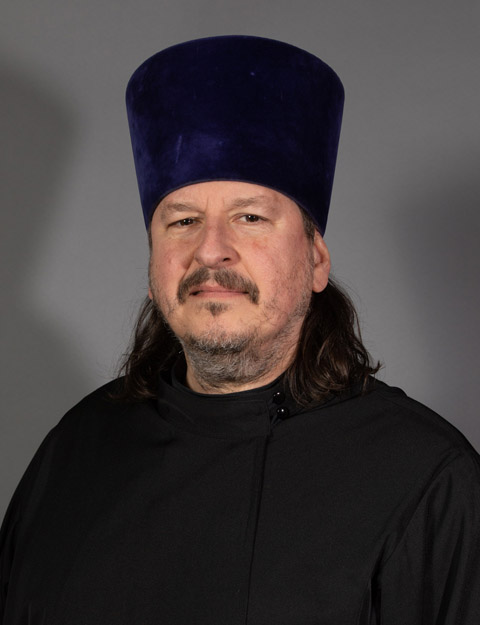
Protodeacon Serge Arlievsky
Ordained to the diaconate in January 1995, Father Serge has a long history of contributions to the advancement of youth education and liturgical music in the Russian Orthodox Church Outside of Russia. A longtime member of the Synodal Liturgical Music Commission, his numerous endeavors have influenced countless people. These include many years as Director of the parish school at Holy Protection Church in Nyack, and serving as a key organizer of the annual ROCM Singers’ and St Herman Youth Conferences as well as the summer Orthodox NORR Camp. Father Serge now serves as the senior protodeacon at the Synodal Cathedral of Our Lady of the Sign in New York City. He is also a member of the faculties of Holy Trinity Seminary in Jordanville, NY and the Synodal School of Liturgical Music (SSLM).

Laryssa Doohovskoy
A passionate educator and choral director, Laryssa Doohovskoy has over 20 years’ experience as a teacher of both children and adults. She runs a thriving private studio in Acton, MA, teaches at the Middlesex School in Concord, MA, is on the faculty of the Synodal School for Liturgical Music (SSLM), is a member of the National Association of Teachers of Singing (NATS), and leads the choir annually at divine services held during the Saint Seraphim Camp. She has been invited to give several masterclasses in the Greater Boston area, and along the East Coast, and serves as an adjudicator for local and national competitions. Since 2012, Ms. Doohovskoy has served as Music Director of the St. Xenia Orthodox Church in Methuen, MA,, where she leads both the adult and children’s choirs. earned her undergraduate degree from New England Conservatory (BM, Vocal Performance). She continued her studies in South Florida, earning a graduate degree from the University of Miami Frost School of Music (MM, Vocal Performance). While at UM, Ms. Doohovskoy was awarded a Teaching Assistantship and the Provost Scholarship for study in Salzburg, Austria. Her principal teachers include Esther Jane Hardenbergh, Mark Pearson, Simeon Tregubov, and Susan Clickner. For more information , please visit www.bostonmezzo.com.
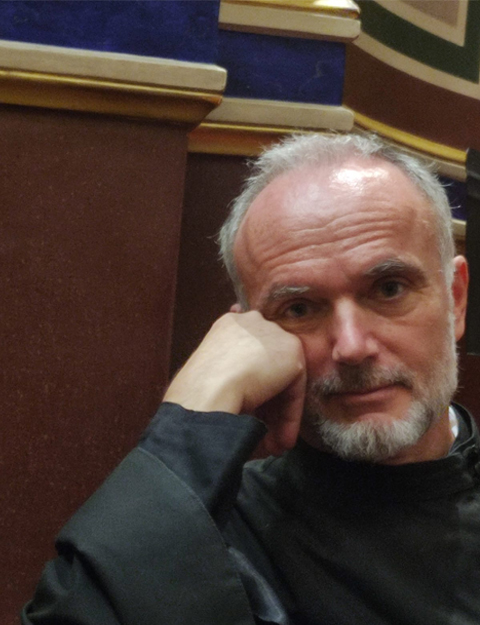
Protodeacon Ioann Drobot
Born in 1957 in the family of Archpriest George Nikolaevich Drobot and Mariamna Elpidiforovna nee Tikhonitsky. From the age of seven he assisted in the altar during services at the St. Sergius Church at the Theological Institute in Paris and at the age of 17 he joined the church choir. He sang in the choir under the direction of Nikolai Mikhailovich Osorgin. In 1977 he joined the “Big Choir” (concert choir) at the St. Alexander Nevsky Cathedral in Paris under the direction of Eugene Ivanovich Evets. Since 1978, he served as an assistant choir master in the church of St. Constantine and Helena in Clamart near Paris. In 1979, he was tonsured a reader. In 1987, he created the male choir named after St. Romanos the Melodist. The choir sang divine services on Saturday and Sunday in the St. Alexander Nevsky Cathedral once a month and performed at concerts of sacred music. In 1995 Ioann became a singer in the church choir of the St. Alexander Nevsky Cathedral under the direction of Vasily Evgenievich Evets. Since 2000, for three years, he participated in the preparation and conducting of the “ideal all-night Vigil” in St. Alexander Nevsky Cathedral. He was ordained a deacon on June 10th, 2012. Now Fr. Ioann is the protodeacon of the St. Alexander Nevsky Cathedral in Paris. He is an author of articles on Russian church chants in Russian, French and English. He is vice chairman of the Society of Adherents for Church Singing.
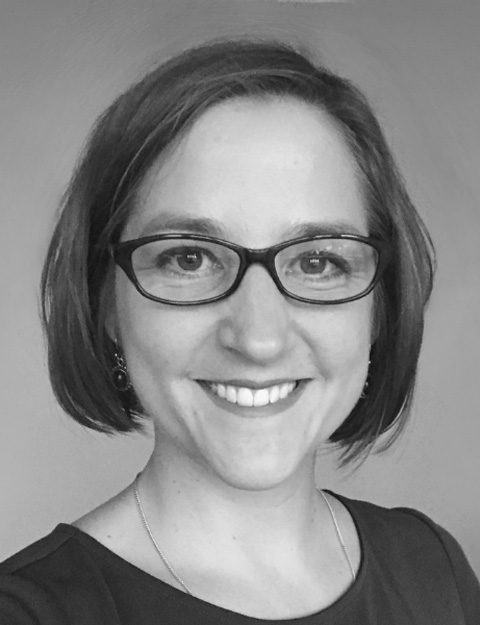
Katya Ermolaeva
Dr. Katya Ermolaeva received her Ph.D. in Musicology from the Royal Conservatoire of Scotland (University of St. Andrews) in 2018. She specializes in 20th-century Russian music and the intersection of music and politics. Her doctoral thesis focused on the political censorship of Sergei Prokofiev’s opera “War and Peace” (1942-1954) and the reconstruction of the original version of the opera (prior to Soviet censorship). Dr. Ermolaeva’s reconstructed version of Prokofiev’s original “War and Peace” has been performed by the Welsh National Opera in Wales and at Covent Garden in London. During her Master’s in Musicology studies at Princeton University, Dr. Ermolaeva authored two articles focusing on Prokofiev’s film score for “Ivan the Terrible” (1945-46, directed by Sergei Eisenstein) and the use of Russian liturgical music in the film. Dr. Ermolaeva is also a certified Level I teacher in the early childhood music program, Music Together, and serves as a musicological consultant on the Music Together Song Advisory Board. With a longstanding dedication to church music, Dr. Ermolaeva has been conducting Orthodox church choirs for over twenty-five years and has served as a Music Director in various parishes of the Russian Orthodox Church Outside of Russia (ROCOR), the Orthodox Church in America (OCA), and the Moscow Patriarchate. Since 2022, she has held the position of Director of Music at Mother of God, Joy of All Who Sorrow, Orthodox Church in Princeton, NJ (OCA).
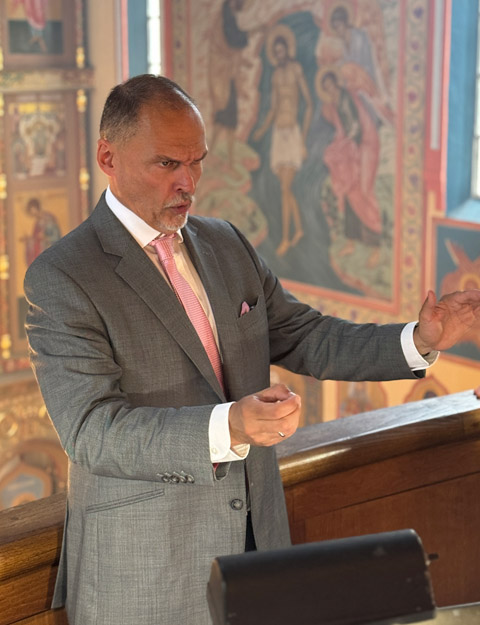
Vadim Gan
Vadim Gan is the choirmaster at the Synodal Cathedral of Our Lady of the Sign, a role to which he brings decades of liturgical experience. He began his service to the Church in the Western American Diocese, where he started conducting church choirs as a mentee of Dimitri Gortinsky, a former choirmaster of the Patriarchal Choir of Serbia. Thereafter, he served ROCOR in multiple capacities at the dioceses of Australia/New Zealand and Midwestern American/Chiacgo prior to relocating to New York. A member of the Synodal Liturgical Music Commission and grandson of the renowned liturgist, Archpriest Rostislav Gan, Vadim strives to ensure that the choir’s contribution to divine services complements the prescribed clergy rituals harmoniously and smoothly. His wife Elizabeth Ledkovsky is the grandaughter of Boris Ledkovsky and daughter of Alexander Ledkovsky, respectively the founder and first successor choirmaster of the Synodal Cathedral Choir. She assists with the Synodal Choir music library and administration and also serves as Secretary of the Synodal School of Liturgical Music (SSLM).
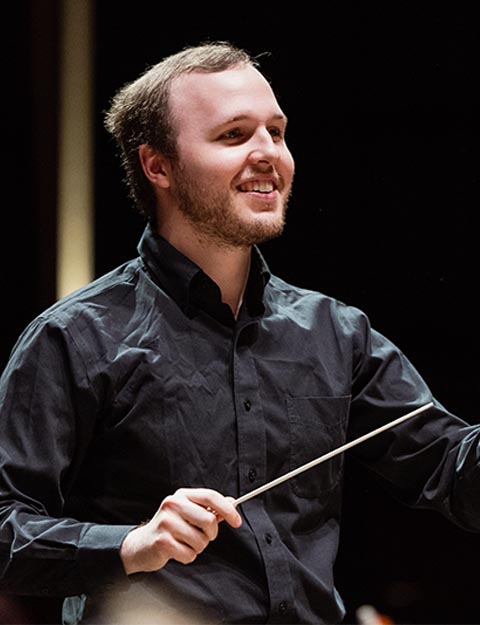
Timothy Morrow is a conductor, pianist, and composer from Basking Ridge, NJ. Currently, he serves as the director of the St. Sergius English Mission Choir at the Synod of Russian Orthodox Bishops (ROCOR) in New York City. He has served as an assistant conductor for the Bard College Community Orchestra, Westminster Community Orchestra, and most recently with the Opera National de Lorraine in Nancy, France in their production of Tchaikovsky’s Eugene Onegin. He has participated in masterclasses with Leon Botstein, José Luis Gomez, and Leonardo Pineda. He also sings with the Philadelphia Symphonic Choir under notable conductors such as Yannick Nézet-Séguin, Joe Miller, and Riccardo Muti.
Timothy studies at Manhattan School of Music with conductor George Manahan. He enjoys working as an accompanist throughout New York and New Jersey and is also fond of folk music, recently traveling to the Republic of Georgia to study Gurian folk songs and Georgian Orthodox Chant.
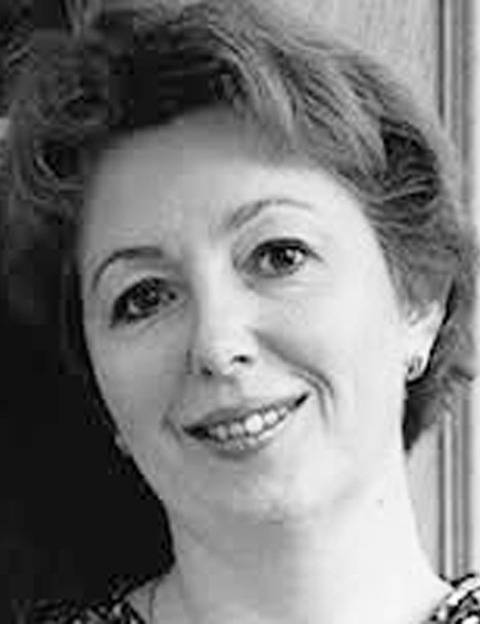
Antonina Lebedeva-Emelina
Dr. Antonina V. Lebedeva-Emelina is the Senior research fellow at the State Institute of Art Studies in Moscow, where she has worked since 1992 in the music history department. Her broad research interests include Russian sacred music of the second half of the 18th century (Berezovsky, Bortniansky, Vedel, Degtiarev, etc.), pre-revolutionary Russia (Nikolsky), the musical culture of the second half of the 18th century, Mussorgsky’s works, source studies, and publication of sacred music from the pre-Glinka period. Her career includes affiliations with Saint Tikhon’s Orthodox University for the Humanities, and the Moscow Conservatory, among others. She is a frequent lecturer at conferences and has been published extensively on a wide range of topics. Her monographs include an exploration of Russian sacred music from the Classical Era (1765-1825), a study of S. Degtiarev’s 12 Sacred Concerti, and The Unknown Sacred Concerti by D. S. Bortniansky.
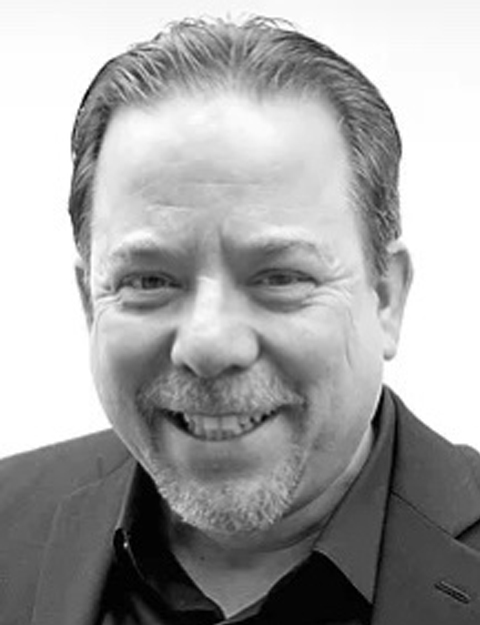
Kurt Sander
Sander is currently a Professor of Composition at Northern Kentucky University. He received a D.M in Music Composition from Northwestern University where he studied with Alan Stout and Andrew Imbrie. The 2019 CD release of Sander’s 90-minute choral work The Divine Liturgy of Saint John Chrysostom on the Reference Recordings label was nominated for a Grammy Award for Best Choral Performance. The recording featured the PaTRAM Institute Singers under the direction of Peter Jermihov.
Kurt Sander’s compositions have been performed in 14 countries on five different continents. Much of his choral and instrumental work takes its inspiration from the sublime dimensions of the Eastern Orthodox faith and its rich artistic traditions.
His sacred choral work has been recorded and performed by professional ensembles throughout the world including Cappella Romana, the Kastalsky Choir (RUS), the Cincinnati Camerata, the Cantata Singers of Ottawa (CAN), the St. Romanos Cappella, the Clarion Choir, Archangel Voices, the Patriarch Tikhon Choir, and The Orthodox Singers (RUS) and the PaTRAM Institute Singers.
In 2017, he received a commission by the Patriarch Tikhon Russian-American Music Institute (PaTRAM) for a new English-language setting of the Liturgy of St. John Chrysostom. This 90-minute work was recorded by the PaTRAM Institute Singers under the direction of Peter Jermihov and released as a 2 CD set on Reference Recordings label in 2019. The CD of this work was nominated for a Grammy in 2020 under the “Best Choral Album” category.
Sander was one of five featured composers on the collaborative composition “Heaven and Earth” which was commissioned by the St. John of Damascus Society and will be recorded in 2021 by the renowned choral ensemble Cappella Romana under the direction of conductor Michael Boyer. The CD is scheduled for international release in 2022 on the Cappella Recordings label.
Sander has also acquired notoriety for his chamber and orchestral writing. He was recently named a finalist in the American Prize for his song cycle “Ella’s Song” about the life of St. Elizabeth, Grand Duchess of Russia. Other instrumental works have been performed by the Transylvania State Philharmonic Orchestra, the Kentucky Symphony Orchestra, the Brasov Philharmonic (Romania), the Pleven Philharmonic (Bulgaria), the Cleveland Chamber Symphony, Synchronia, the Corbett Trio, the Solaris Wind Quintet, and the St. Petersburg Quartet.
Sander currently serves as Professor of Music and Coordinator of Music Theory and Composition at Northern Kentucky University. He holds degrees in composition from Northwestern University, the Cincinnati College-Conservatory of Music, and Cleveland State University where he studied with Bain Murray, Alan Stout, Rudolph Bubalo, and Andrew Imbrie.
Sander’s choral music is published through Musica Russica.
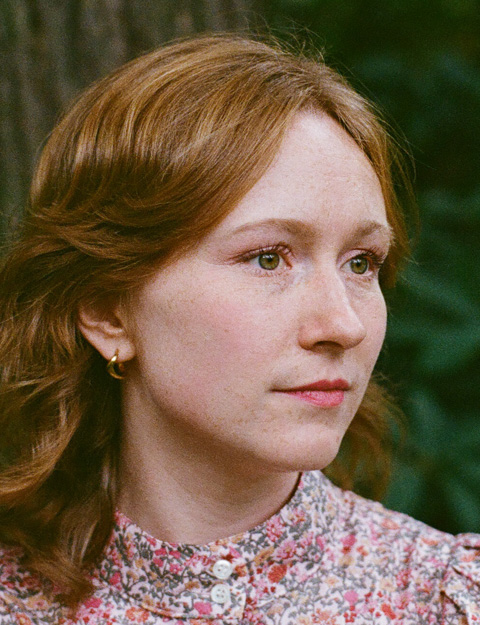
Anastasia Shmytova
Anastasia Shmytova is a musicologist and soprano from Saint Petersburg, Russia. She holds Bachelor of Arts degrees in Musicology from the Saint Petersburg State University and Bard College, and is currently pursuing a PhD in Musicology at Princeton University. Her dissertation, titled “Musical, Liturgical and Aesthetic Change in Seventeenth-century Russia”, explores the political and religious turbulence of the seventeenth century in Muscovy and the effects these crises had on the liturgical music of the Russian Orthodox Church. Her project has received support from the Alvin H. Johnson AMS 50 Dissertation Fellowship, the Princeton Institute for International and Regional Studies, and the Center for Culture, Society and Religion. In addition to her research, Anastasia sings with the Princeton University Chamber Choir, the Aquinas Institute Choral Scholars, Osanna Chamber Ensemble, and Chronos Ensemble. She is the founder and director of Demestvo, an ensemble that performs Slavic medieval chant and early polyphony.
